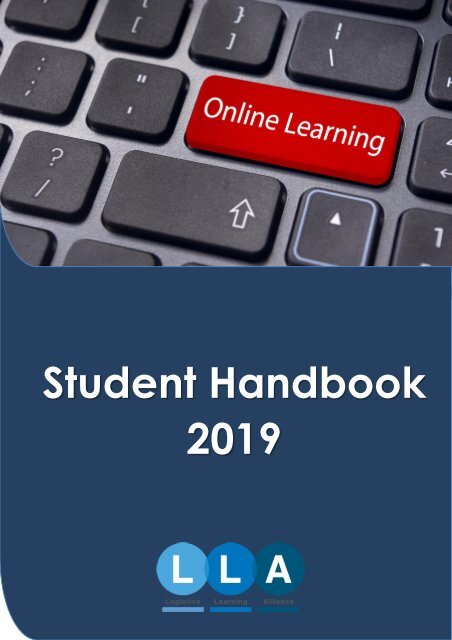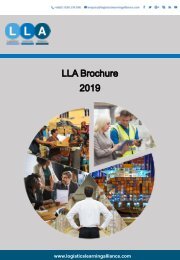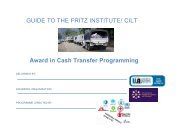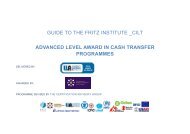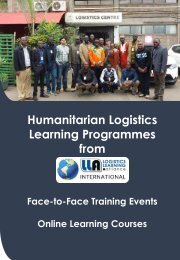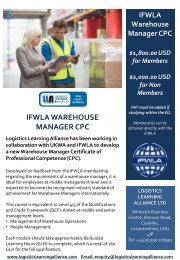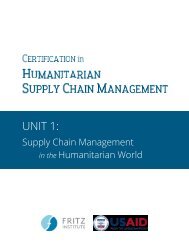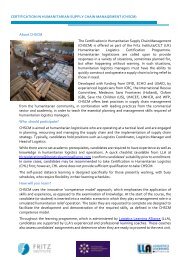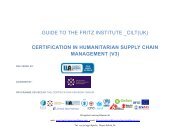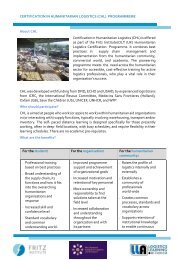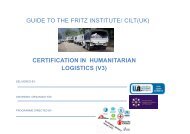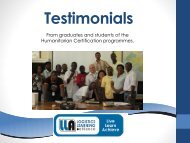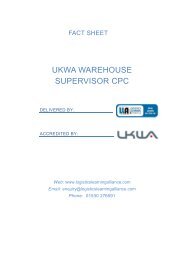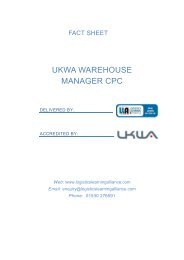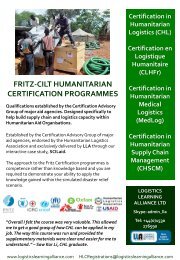Student Handbook 2019
You also want an ePaper? Increase the reach of your titles
YUMPU automatically turns print PDFs into web optimized ePapers that Google loves.
<strong>Student</strong> <strong>Handbook</strong><br />
<strong>2019</strong>
Contents<br />
1. WELCOME .................................................................................................................. 6<br />
1.1 ABOUT THIS HANDBOOK ........................................................................................... 6<br />
2. GETTING STARTED ..................................................................................................... 7<br />
2.1 MINIMUM PC REQUIREMENTS .................................................................................... 7<br />
2.2 RUNNING INSTRUCTIONS .......................................................................................... 7<br />
2.3 LEARNING MATERIALS ................................................................................................ 7<br />
2.4 PROBLEM SOLVING .................................................................................................... 8<br />
2.5 LABELLING AND FORWARDING EMAILS ...................................................................... 8<br />
Humanitarian ................................................................................................................. 8<br />
Commercial ................................................................................................................... 8<br />
3. HOW WE CAN HELP .................................................................................................... 9<br />
3.1 STUDENT SUPPORT .................................................................................................. 9<br />
3.2 TUTOR SUPPORT ...................................................................................................... 9<br />
3.3 TECHNICAL SUPPORT ................................................................................................. 9<br />
3.4 STUDENTS WITH A DISABILITY ................................................................................. 9<br />
3.5 HOW TO MAKE AN INSTALMENT PAYMENT .................................................................. 9<br />
4. HOW YOUR WORK IS ASSESSED .............................................................................. 10<br />
4.1 TASKS ...................................................................................................................... 10<br />
4.2 COMPETENCY ............................................................................................................ 10<br />
4.2 INDEPENDENT ASSESSMENTS .................................................................................... 11<br />
4.3 COMPLETING YOUR STUDIES ..................................................................................... 12<br />
5. INTEGRITY OF YOUR STUDIES .................................................................................. 12<br />
5.1 PLAGIARISM ............................................................................................................. 12<br />
5.2 CUTTING & PASTING ................................................................................................. 12<br />
5.3 COLLUSION .............................................................................................................. 12<br />
5.4 PROCEDURE FOR PLAGIARISM AND COLLUSION ............................................................ 13<br />
5.5 PROCEDURE FOR CHECKING PLAGIARISM AND COLLUSION ............................................ 13<br />
Version 1.7 May <strong>2019</strong> Page 2
5.6 STUDENT REGISTRATION ........................................................................................... 13<br />
5.7 CLAIMS FOR CERTIFICATION ...................................................................................... 13<br />
5.8 STUDENT MANAGEMENT ............................................................................................. 13<br />
6. HEALTH & SAFETY..................................................................................................... 13<br />
7. TIPS FOR SUCCESS .................................................................................................. 14<br />
7.1 MANAGING YOUR TIME ............................................................................................. 14<br />
7.2 ASKING FOR HELP ................................................................................................... 14<br />
7.3 LISTENING TO TUTOR ADVICE ................................................................................. 14<br />
7.4 BEING AWARE OF YOUR COURSE DEADLINE ............................................................ 14<br />
7.5 REGULAR TASK SUBMISSIONS ................................................................................. 14<br />
8. WHAT TO DO NEXT .................................................................................................. 15<br />
8.1 ENQUIRY TEAM ......................................................................................................... 15<br />
9. LLA EXTENSION POLICY ............................................................................................. 15<br />
10. APPENDICES ............................................................................................................. 16<br />
APPENDIX 1 - TIME MANAGEMENT PLAN TEMPLATE .......................................................... 16<br />
APPENDIX 2 – DATA PROTECTION AND GDPR POLICY ......................................................... 17<br />
1. Data protection principles ........................................................................................... 17<br />
2. General provisions ..................................................................................................... 17<br />
3. Lawful, fair and transparent processing ........................................................................ 17<br />
4. Lawful purposes ........................................................................................................ 17<br />
5. Data minimisation ..................................................................................................... 18<br />
6. Accuracy .................................................................................................................. 18<br />
7. Archiving / removal ................................................................................................... 18<br />
8. Security ................................................................................................................... 18<br />
9. Breach ..................................................................................................................... 18<br />
APPENDIX 3 – LLA LEARNING AGREEMENT .......................................................................... 19<br />
APPENDIX 4 – EQUALITY AND DIVERSITY POLICY .............................................................. 21<br />
Communication of the policy ........................................................................................... 21<br />
Version 1.7 May <strong>2019</strong> Page 3
Review of the policy ...................................................................................................... 21<br />
Statement of Principles .................................................................................................. 21<br />
Discrimination ............................................................................................................... 21<br />
Racial Harassment ......................................................................................................... 22<br />
Sexual harassment ........................................................................................................ 22<br />
Bullying ....................................................................................................................... 22<br />
Victimisation ................................................................................................................. 22<br />
Vulnerable adults .......................................................................................................... 22<br />
Protection of children ..................................................................................................... 23<br />
Training ....................................................................................................................... 23<br />
Safeguarding ................................................................................................................ 23<br />
Equality and Diversity Lead ............................................................................................ 23<br />
APPENDIX 5 – COMPLAINTS AND APPEALS PROCEDURE .................................................. 24<br />
APPEALS PROCEDURE .................................................................................................... 24<br />
GRIEVANCE PROCEDURE ................................................................................................ 25<br />
APPENDIX 6 – LLA HEALTH AND SAFETY POLICY .................................................................. 25<br />
GENERAL POLICY STATEMENT ........................................................................................ 25<br />
HEALTH AND SAFETY IN TRAINING CENTRES ................................................................... 25<br />
HEALTH AND SAFETY FOR ONSite training ........................................................................ 26<br />
HEALTH AND SAFETY FOR APPRENTICESHIPS ................................................................... 26<br />
Health and Safety for Distance Learning <strong>Student</strong>s ............................................................. 26<br />
MONITORING EFFECTIVENESS ........................................................................................ 26<br />
Policy Review ................................................................................................................ 26<br />
APPENDIX 6.1 - computers and display screens. How Can I Help Myself? ................................ 26<br />
Getting Comfortable ...................................................................................................... 26<br />
Keying In ..................................................................................................................... 27<br />
Using a Mouse .............................................................................................................. 27<br />
Reading The Screen ....................................................................................................... 27<br />
Version 1.7 May <strong>2019</strong> Page 4
Posture and Breaks ....................................................................................................... 27<br />
Health Problems Arising From Bad Working Practice at VDU Equipment ................................ 27<br />
APPENDIX 7 - Internal Verification Policy ............................................................................ 28<br />
Communication of the policy ........................................................................................... 28<br />
Policy Statement ........................................................................................................... 28<br />
Statement of Principles .................................................................................................. 28<br />
Process ........................................................................................................................ 29<br />
Review of the policy ...................................................................................................... 29<br />
APPENDIX 8 - SAFEGUARDING & PREVENT POLICY STATEMENT............................................. 30<br />
1. Introduction and Aims ............................................................................................. 30<br />
2. Definitions ............................................................................................................. 30<br />
3. Designated Safeguarding Lead ................................................................................. 31<br />
3.1 Designated Prevent Lead ...................................................................................... 31<br />
4. Responsibilities ......................................................................................................... 31<br />
5. Procedures ............................................................................................................... 32<br />
6. students who are minors ............................................................................................ 32<br />
7. <strong>Student</strong> Information .................................................................................................. 32<br />
8. Confidentiality and information sharing ........................................................................ 32<br />
9. Staff Training ............................................................................................................ 33<br />
10. Online Monitoring .................................................................................................... 33<br />
11. Policy Access ........................................................................................................... 33<br />
12. Review ................................................................................................................... 33<br />
APPENDIX 8.1 - STAFF GUIDANCE ..................................................................................... 33<br />
APPENDIX 8.2 – SAFEGUARDING AND PREVENT LINKS ......................................................... 34<br />
Appendix 8.3 – LLA TRAINING DETAILS .............................................................................. 35<br />
Version 1.7 May <strong>2019</strong> Page 5
1. WELCOME<br />
1.1 ABOUT THIS HANDBOOK<br />
This handbook aims to answer some of the most frequently asked questions that our students<br />
have, and to give students reference material for the administration of their studies with LLA.<br />
<strong>Student</strong> Support is available during office hours Monday – Friday 08:30 – 15:00 hrs GMT, via<br />
Skype, email and telephone.<br />
Tutors are available during the same hours and, if your Tutor is unavailable, there are other<br />
Tutors available who are all expert across the various suites of Programmes, who will be<br />
able to help and advise as necessary, should you need it.<br />
Once you have completed your Course, we have an Enquiry Team who can advise you of the<br />
next step in your learning.<br />
Version 1.7 May <strong>2019</strong> Page 6
2. GETTING STARTED<br />
2.1 MINIMUM PC REQUIREMENTS<br />
• A computer capable of running Internet Explorer 7.0. We would recommend you use<br />
the Google Chrome web browser for best results.<br />
• A Windows operating system is preferable. Windows 7/8 or later is recommended,<br />
however the open source versions of the case study should be suitable for Mac users.<br />
• Some of the files in the download require Microsoft Excel and Adobe Acrobat Reader<br />
in order to run. If these packages are not currently installed on your system, you will<br />
need to install Adobe Acrobat Reader and Excel Viewer. These can be accessed from<br />
the left hand menu under ‘Downloads’. Click ‘downloads’, then follow the on screen<br />
instructions. For Mac users the Course files can also be downloaded and opened with<br />
“Open Office” – available as a free download.<br />
• Recommended screen resolution 1024 x 768 pixels<br />
2.2 RUNNING INSTRUCTIONS<br />
Once you have completed the full enrolment process, you will be forwarded an email from <strong>Student</strong><br />
Support, giving you details of how to log in to your chosen Course, how to access the learning<br />
materials and access the virtual learning environment case study. This email will also include a<br />
“How To Get Started” guide which you must refer to in order to get started on your programme.<br />
You will also be provided with your introductory ‘Case Study Questions’ which you should complete<br />
once you have downloaded the case study and learning materials.<br />
In order to correctly install and operate the SCIL case study that is used for all of our online<br />
courses, please refer to the ‘How to Get Started’ guide in your Welcome email. If you have not<br />
received either your Welcome email or the guide, please contact us.<br />
Learning plans are sent to all students at the beginning of each unit. These plans are simply<br />
guides. Some students are more used to a structured, classroom based way of learning so these<br />
guides are simply a way to give more structure to the learning system should you need it.<br />
You are in control of your own learning and if you wish to submit 3 tasks per week or more/less,<br />
then that is up to you. So long as the previous task has been cleared by your Tutor and there are<br />
no outstanding questions, you can progress at your preferred rate.<br />
2.3 LEARNING MATERIALS<br />
Please note the learning materials for all units for your course are available to download. Details of<br />
how to download these learning materials are included in your Welcome email and/or ‘How to Get<br />
Started’ guide. These are available in PDF format. To view these files you may need to download<br />
and install Acrobat Reader if your PC or browser does not support viewing PDFs.<br />
Version 1.7 May <strong>2019</strong> Page 7
2.4 PROBLEM SOLVING<br />
Most issues can be resolved by following the ‘How to Get Started’ guide but, occasionally, you<br />
may need additional help to get started. If you do require additional assistance, please contact<br />
the <strong>Student</strong> Support team at the email address that you received the welcome email from.<br />
Once you have tried all the steps in the How To Get Started guide, if you have problems with the<br />
case study please contact us, giving as much information about the issue as possible. A screen<br />
shot of the error message or last screen you were working in is often a very useful tool for<br />
diagnosing the problem. You can take a picture of the current screen by pressing "Ctrl" and<br />
"PrtScrn" buttons together. Open a new email and press "Ctrl V" to paste the screen picture into<br />
the email. Alternatively open a new Word document, press “Ctrl V”, save and email that as an<br />
attachment.<br />
2.5 LABELLING AND FORWARDING EMAILS<br />
HUMANITARIAN<br />
CHL/CLH<br />
Name * Unit * Number * Task * Number: e.g: John Smith Unit 1 Task 1<br />
CHSCM/Medlog<br />
Name * Task * Number: e.g: John Smith Task 1<br />
COMMERCIAL<br />
Name * Programme * Unit Number * Task * Number:<br />
E g : John Smith L5 Core Management – Task 1<br />
Please forward every email to the email address from where you received your welcome email.<br />
Please do not send emails directly to the Tutor, Finance Department or Enquiry inboxes.<br />
All emails are required to go to <strong>Student</strong> Support who will then forward your emails to<br />
your Tutor. This is for record keeping/audit purposes.<br />
Version 1.7 May <strong>2019</strong> Page 8
3. HOW WE CAN HELP<br />
3.1 STUDENT SUPPORT<br />
For all those Course related issues that are not necessarily task related, we have a<br />
dedicated <strong>Student</strong> Support Team who are available via email (the email you forward your<br />
tasks to), Skype (admin_lla) or by telephone 01530 276591. <strong>Student</strong> Support will be your first<br />
point of contact throughout the Course.<br />
3.2 TUTOR SUPPORT<br />
For task related queries, you have an industry-experienced, fully qualified Tutor. They are<br />
expert in the various logistics areas and are available via Skype (please request Skype name<br />
from your allocated Tutor), email (via <strong>Student</strong> Support) and on the telephone 01530<br />
276592. If you are struggling, need support or simply want guidance on your tasks, your<br />
Tutor will be happy to help. If your Tutor is on annual leave or is unavailable for any reason,<br />
one of the other Tutors will be able to assist in their absence.<br />
3.3 TECHNICAL SUPPORT<br />
If you have a Course related technical query, your first option is to refer to the How To Get<br />
Started guide. If this does not resolve the issue, please take a screen shot of the problem and<br />
email it to us.<br />
3.4 STUDENTS WITH A DISABILITY<br />
<strong>Student</strong>s who enrol on a Programme with LLA can declare a disability at any time, although<br />
preferably, for pre-existing conditions, during the registration process. Special arrangements<br />
can be made for students who can provide evidence of having a learning difficulty such as<br />
dyslexia. Such students can request additional support at any time. Once a disability is<br />
disclosed, a needs assessment will be carried out and reasonable adjustments to assessment<br />
arrangements made.<br />
3.5 HOW TO MAKE AN INSTALMENT PAYMENT<br />
If you need to make a payment:<br />
1. Follow the instructions on the email containing the invoice or payment details.<br />
2. Payments are acceptable via bank transfer, Paypal or through credit/debit card using<br />
WorldPay (please request a payment link if this is your preferred option).<br />
3. Please note instalments are payable at a maximum of six monthly intervals or earlier as<br />
advised by LLA Finance.<br />
Version 1.7 May <strong>2019</strong> Page 9
4. HOW YOUR WORK IS ASSESSED<br />
4.1 TASKS<br />
The assessment process is designed for two purposes:<br />
1. To test the knowledge of the individual<br />
2. To test the ability of the individual to apply that knowledge<br />
The assessment process will take into account prior learning, achievement and experience<br />
which is appropriate to the requirements of the Programme and these should be brought out<br />
in your responses to the tasks set wherever possible.<br />
Each candidate is assigned a personal Tutor, who will work with you to provide the evidence to<br />
satisfy:<br />
1. All the performance criteria<br />
2. All aspects of the qualification<br />
3. All the knowledge requirement of the qualification<br />
Evidence of performance will be assessed on an on-going basis by Logistics Learning Alliance<br />
through your responses to the assigned tasks. For regulated and accredited qualifications your<br />
final completion will need to be verified by the appropriate Awarding Organisation before your<br />
final Certificate is issued.<br />
The Awarding Organisations we work with have set time limits on your registration period<br />
in which to complete your Programme. You should check what this limit is and have it<br />
firmly in mind as you work through the Programmes. All of the Programmes have been<br />
designed to be completed in considerably less time than the maximum allowed. The average<br />
completion times for the Programmes and are all achievable given the right level of<br />
commitment.<br />
4.2 COMPETENCY<br />
LLA does not follow an examination route for the majority of its Programmes which have<br />
been designed against outcomes of performance, i.e. what you should be able to do at the<br />
end of the Programme. For this, competence, assessment, the Tutor is trying to find out not<br />
just how much you know, but if you understand it sufficiently to apply it in real life.<br />
Unlike a teacher, or college Tutor, they have no knowledge of your background, past<br />
attainments or experience. They can take nothing for granted, and in addition cannot be too<br />
specific in the advice they give you at times, as this may give you the answer without<br />
you having to research it yourself and working it out from first principles. It is common for<br />
questions to be asked to clarify particular issues but once you have completed a few of the<br />
lessons you will see how the system works.<br />
Your Tutor will use a combination of directive and supportive behaviour to Tutor you through<br />
this process. This may be delivered face-to-face, via e-mail, or by a fusion of the two. You will<br />
Version 1.7 May <strong>2019</strong> Page 10
also be required to submit regular reports to your Tutor, who will brief the appropriate assessor<br />
as you progress through the tasks.<br />
If at any time you feel you need help or advice either on the Course content or the questions<br />
being asked, please let us know. There may also be some difficulty in understanding the<br />
terminology, or understanding fully the problem you feel you have. If you are experiencing<br />
difficulties please let us know as soon as possible.<br />
In each unit, following the completion of a brief introductory task, your “line manager” will set<br />
you a series of tasks designed to enable you to demonstrate your underlying knowledge and<br />
understanding.<br />
Reporting back to you will show and justify how, using this knowledge and understanding<br />
together with your own experience, you would respond to each task. The full Course of<br />
study is then completed in this tried and tested ‘little and often’ way enabling the principles<br />
learned to be gradually integrated into your real life daily work plan. The method is<br />
enjoyable, practical and a genuine fast-track route to an internationally recognised<br />
qualification.<br />
You will be taken through the steps of:<br />
1. Analysing the current operational processes for a given scenario<br />
2. Identifying the simulated company’s current and future requirements<br />
3. Devising a series of options to meet those requirements<br />
4. Showing how to implement your chosen solution<br />
On the completion of the tasks for the unit, you will have compiled a portfolio of evidence of<br />
competence which your Tutor will refer for assessment by a qualified Assessor and/or Internal<br />
Verifier. This may lead to a request for further evidence of your competence. In this<br />
eventuality, the candidate may have to re-visit one or two of the tasks and expand on or<br />
clarify work previously submitted. This will only happen if the final Assessor and/or Internal<br />
Verifier disagrees with the assessment of the learner’s Tutor.<br />
4.2 INDEPENDENT ASSESSMENTS<br />
Some Programmes offered by LLA have a requirement for Independent Assessment. This<br />
is where a selected piece of Course work has to be assessed externally to LLA.<br />
The Programme of submissions for the Independent Assessment is controlled by the Awarding<br />
Organisation and you will be informed of the relevant submission dates.<br />
You are strongly advised not to leave this work until the end of the Programme, as there can<br />
sometimes be limited occasions when we can submit them for review and feedback will take<br />
longer than you will have been accustomed to with your LLA task submissions.<br />
Where your Programme has an element of Independent Assessment we will send you out full<br />
instructions on how to prepare the report and you should plan your submission into your<br />
overall work plan for the Programme.<br />
Candidates are fully supported through their report construction and subsequent draft<br />
submissions. However, in regards to the final submission for independent assessment, we allow<br />
Version 1.7 May <strong>2019</strong> Page 11
two failed attempts (Refers) where all standard advice and examples have been supplied to the<br />
candidate, the project portfolio will then get reviewed by a second assessor. If that assessor<br />
cannot add to the prior instruction given, then the candidate will not receive any further advice<br />
and the project is left to the approval of the Independent Assessor.<br />
4.3 COMPLETING YOUR STUDIES<br />
Once you have passed your Independent Assessment (if necessary for your chosen Course) and<br />
your Tutor has cleared all your tasks, you have completed your studies (qualifications are subject<br />
to external verification by the Awarding Organisation). For those studying LLA Short Courses, you<br />
will receive a signed Certificate through the post from LLA. In the case of those studying Fritz-CILT<br />
Humanitarian Certification Programmes, certificates will be sent directly by the Awarding<br />
Organisation. This can take 6-8 weeks depending upon local postal services. In the case of<br />
Commercial qualifications the Awarding Organisation will forward you their Certificate following<br />
external verification, at the latest.<br />
5. INTEGRITY OF YOUR STUDIES<br />
5.1 PLAGIARISM<br />
• Copying someone else’s work and presenting it as your own is unacceptable.<br />
• Copying sections of someone else’s work but changing the odd word or phrase will be<br />
rejected.<br />
• Work must be your own and written by you.<br />
• If you use someone else’s work as your own, it will be rejected. You will be required<br />
to redo and resubmit that task.<br />
5.2 CUTTING & PASTING<br />
Cutting and pasting from the case study and/or learning material will not be accepted as evidence<br />
of learning. All work presented to your Tutor must be written in your own words to show a clear<br />
understanding of the task and the use of additional learning material. Work sent to your Tutor that<br />
has been created by cutting and pasting will be rejected. You will be required to be redone and<br />
resubmitted.<br />
5.3 COLLUSION<br />
Do not submit work produced collaboratively, unless expressly permitted by your Tutor. All<br />
work submitted has to be solely your own work. Whilst studying the Course with others can<br />
give added support and help the studying process, the task submitted must be unique to each<br />
student.<br />
Version 1.7 May <strong>2019</strong> Page 12
5.4 PROCEDURE FOR PLAGIARISM AND COLLUSION<br />
The acting Tutor, Assessor and/or Internal Verifier alert the Centre Coordinator to the incident<br />
as soon as it is recognised. The Centre Coordinator reviews samples of work from the student/s<br />
involved and takes the decision whether to contact the student/s. In severe cases line<br />
managers and sponsors are involved in the disciplinary procedure and can lead to students<br />
being disqualified from the Programme.<br />
5.5 PROCEDURE FOR CHECKING PLAGIARISM AND COLLUSION<br />
All students should be aware that work submitted for assessment purposes will be submitted to<br />
Turnitin UK software for screening. Any piece of assessed work may be submitted to the<br />
software for similarity review and retained within the Turnitin UK source database for future<br />
comparisons.<br />
5.6 STUDENT REGISTRATION<br />
All students are registered with the Awarding Organisation in the month of their payment and<br />
online registration.<br />
5.7 CLAIMS FOR CERTIFICATION<br />
A student cannot be claimed for certification until all tasks have been completed; a check of this<br />
is part of our completion process. A student portfolio is not complete until all Candidate<br />
Assessment Records have been completed and submitted by an Assessor. A final check is the<br />
Portfolio Check List (PCL) signed by an assessor and Internal Verifier.<br />
5.8 STUDENT MANAGEMENT<br />
All students are registered on LLA’s CRM system; details include name, Organisation, email<br />
address and contact numbers. The Awarding Organisation receives identical information and<br />
issues an identification number. The actual student number is issued upon Course payment.<br />
This system ensures the correct identification of students and if applicable the corresponding<br />
Organisation. All data is protected under the Data Protection Act of May 2018.<br />
6. HEALTH & SAFETY<br />
LLA has a full policy regarding the Health and Safety of its students. The full policy can be found<br />
and read in Appendix 6 of this <strong>Handbook</strong>.<br />
Version 1.7 May <strong>2019</strong> Page 13
7. TIPS FOR SUCCESS<br />
7.1 MANAGING YOUR TIME<br />
Certain students utilise a Time Management Plan.<br />
Management Plan template.<br />
See the Appendices for a Time<br />
<strong>Student</strong>s with LLA usually have very busy lives. Not only are they employed, they have<br />
busy family and social lives too. If you need advice on time management, please feel free to<br />
ask your Tutor for tips.<br />
7.2 ASKING FOR HELP<br />
As previously mentioned, we have a full <strong>Student</strong> Support Team available to all students and<br />
your Tutor will give you advice and help if you need it. Remember: all you have to do is ask.<br />
7.3 LISTENING TO TUTOR ADVICE<br />
If your Tutor gives you advice, the best suggestion is to listen carefully and follow this advice.<br />
Our Tutors have worked with many students over many years and have come across a wide<br />
range of problems, issues and unusual events that have prevented work from continuing, at<br />
least in the short term. Tutors are here to advise and support all students.<br />
7.4 BEING AWARE OF YOUR COURSE DEADLINE<br />
All Courses have a deadline in which to complete. You will be sent your course expiry, together<br />
with your student number, after you have started your course. <strong>Student</strong>s who fully commit to the<br />
Programme and finish within the initial timeframe are those who, in the long run, are more<br />
successful with their studies. IF YOU NEED TO BE REMINDED OF YOUR STUDY DEADLINE,<br />
PLEASE CONTACT STUDENT SUPPORT.<br />
7.5 REGULAR TASK SUBMISSIONS<br />
There is total flexibility with student’s learning, and they can factor into their study times,<br />
periods of holiday, increased work load within their employment or other times when study<br />
may need to take a ‘back seat’ and catch up with work in their own time. However, it is best<br />
to submit tasks on a regular basis around these busier periods. Experience has shown that<br />
students who make regular task submissions are more likely to complete the Course than<br />
those who do not.<br />
Version 1.7 May <strong>2019</strong> Page 14
8. WHAT TO DO NEXT<br />
8.1 ENQUIRY TEAM<br />
We have an Enquiry Team who will be able to advise you on the next Course you may want<br />
to undertake with LLA to further progress your career, further enhance your skills or to gain<br />
the next level of qualification.<br />
Please contact the Enquiry Team on: 01530<br />
276590 Or email:<br />
Enquiry@logisticslearningalliance.com<br />
9. LLA EXTENSION POLICY<br />
Extensions are only permitted in exceptional circumstances, and for a maximum of six months.<br />
The team at LLA will contact you as you approach the end of your Programme.<br />
Please note that extension policies are regularly updated and, for the most up-to-date<br />
information and quotation, contact LLA <strong>Student</strong> Support prior to your expiry date.<br />
Version 1.7 May <strong>2019</strong> Page 15
10. APPENDICES<br />
APPENDIX 1 - TIME MANAGEMENT PLAN TEMPLATE<br />
Weekly Time Management Plan<br />
Week Commencing: Monday 4 – Sunday 10<br />
Monday<br />
Tuesday<br />
Wednesday<br />
Thursday<br />
Friday<br />
Saturday<br />
Sunday<br />
Version 1.7 May <strong>2019</strong> Page 16
APPENDIX 2 – DATA PROTECTION AND GDPR POLICY<br />
1. DATA PROTECTION PRINCIPLES<br />
LLA is committed to processing data in accordance with its responsibilities under the GDPR.<br />
Article 5 of the GDPR requires that personal data shall be:<br />
a. processed lawfully, fairly and in a transparent manner in relation to individuals;<br />
b. collected for specified, explicit and legitimate purposes and not further processed in a<br />
manner that is incompatible with those purposes; further processing for archiving purposes<br />
in the public interest, scientific or historical research purposes or statistical purposes shall<br />
not be considered to be incompatible with the initial purposes;<br />
c. adequate, relevant and limited to what is necessary in relation to the purposes for which<br />
they are processed;<br />
d. accurate and, where necessary, kept up to date; every reasonable step must be taken to<br />
ensure that personal data that are inaccurate, having regard to the purposes for which<br />
they are processed, are erased or rectified without delay;<br />
e. kept in a form which permits identification of data subjects for no longer than is necessary<br />
for the purposes for which the personal data are processed; personal data may be stored<br />
for longer periods insofar as the personal data will be processed solely for archiving<br />
purposes in the public interest, scientific or historical research purposes or statistical<br />
purposes subject to implementation of the appropriate technical and organisational<br />
measures required by the GDPR in order to safeguard the rights and freedoms of<br />
individuals; and<br />
f. processed in a manner that ensures appropriate security of the personal data, including<br />
protection against unauthorised or unlawful processing and against accidental loss,<br />
destruction or damage, using appropriate technical or organisational measures.”<br />
2. GENERAL PROVISIONS<br />
a. This policy applies to all personal data processed by LLA.<br />
b. The Responsible Person shall take responsibility for LLA ongoing compliance with this<br />
policy.<br />
c. This policy shall be reviewed at least annually.<br />
d. LLA shall register with the Information Commissioner’s Office as an organisation that<br />
processes personal data.<br />
3. LAWFUL, FAIR AND TRANSPARENT PROCESSING<br />
a. To ensure its processing of data is lawful, fair and transparent, LLA shall maintain a<br />
Register of Systems.<br />
b. The Register of Systems shall be reviewed at least annually.<br />
c. Individuals have the right to access their personal data and any such requests made to LLA<br />
shall be dealt with in a timely manner.<br />
4. LAWFUL PURPOSES<br />
a. All data processed by LLA must be done on one of the following lawful bases: consent,<br />
contract, legal obligation, vital interests, public task or legitimate interests (see ICO<br />
guidance for more information).<br />
b. LLA shall note the appropriate lawful basis in the Register of Systems.<br />
c. Where consent is relied upon as a lawful basis for processing data, evidence of opt-in<br />
consent shall be kept with the personal data.<br />
d. Where communications are sent to individuals based on their consent, the option for the<br />
individual to revoke their consent should be clearly available and systems should be in<br />
Version 1.7 May <strong>2019</strong> Page 17
place to ensure such revocation is reflected accurately in LLA systems.<br />
5. DATA MINIMISATION<br />
a. LLA shall ensure that personal data are adequate, relevant and limited to what is necessary<br />
in relation to the purposes for which they are processed.<br />
b. LLA will retain personal data for a maximum of 7 years on completion of their programme.<br />
6. ACCURACY<br />
a. LLA shall take reasonable steps to ensure personal data is accurate.<br />
b. Where necessary for the lawful basis on which data is processed, steps shall be put in place<br />
to ensure that personal data is kept up to date.<br />
7. ARCHIVING / REMOVAL<br />
a. To ensure that personal data is kept for no longer than necessary, the LLA shall put in<br />
place an archiving policy for each area in which personal data is processed and review this<br />
process annually.<br />
b. The archiving policy shall consider what data should/must be retained, for how long, and<br />
why.<br />
8. SECURITY<br />
a. LLA shall ensure that personal data is stored securely using modern software that is keptup-to-date.<br />
b. Access to personal data shall be limited to personnel who need access and appropriate<br />
security should be in place to avoid unauthorised sharing of information.<br />
c. When personal data is deleted this should be done safely such that the data is<br />
irrecoverable.<br />
d. Appropriate back-up and disaster recovery solutions shall be in place.<br />
9. BREACH<br />
In the event of a breach of security leading to the accidental or unlawful destruction, loss,<br />
alteration, unauthorised disclosure of, or access to, personal data, LLA shall promptly assess the<br />
risk to people’s rights and freedoms and if appropriate report this breach to the ICO (more<br />
information on the ICO website).<br />
Version 1.7 May <strong>2019</strong> Page 18
APPENDIX 3 – LLA LEARNING AGREEMENT<br />
By signing this learning agreement, I recognise that I, or my organisation, have contracted LLA to<br />
supply the services required to complete my course of study.<br />
I understand that, to comply with UK Government (HMRC) and UK Awarding Organisation<br />
requirements, LLA will retain my personal data for a maximum of 7 years from the completion of<br />
my studies.<br />
I have viewed the LLA privacy policy on the website at www.logisticslearningalliance.com<br />
I also understand that:<br />
1. I can request to access the personal data held by LLA<br />
2. LLA will not hold or process any sensitive personal data<br />
3. I can update my personal data at any time<br />
4. I can request that my personal data is deleted except as specified by regulatory<br />
requirements<br />
5. My personal data will not be used for profiling or automated decision making<br />
6. If I am unable to complete my programme of study, LLA will retain my personal data for a<br />
maximum of 7 years and that it will not be processed further unless I request to rejoin the<br />
programme<br />
7. My personal data will be shared only with the Chartered Institute of Logistics and<br />
Transport/UKWA for the purposes of student registration.<br />
8. LLA undertakes to hold my personal data in a safe and secure manner.<br />
Version 1.7 May <strong>2019</strong> Page 19
Learning agreement between …………………………………… (<strong>Student</strong> Name) and Logistics Learning<br />
Alliance Ltd In committing to this Programme I will follow the agreed process:<br />
1. To agree a learning plan for each unit with LLA<br />
2. To access the materials and tasks made available to me and to complete each task<br />
as agreed in my learning plan<br />
3. To respond to all requests from my Tutor for clarification and improvement to my<br />
assignments within 7 days<br />
4. To complete each part of the Programme under normal circumstances within the agreed<br />
learning plan.<br />
5. Under special circumstances to request dispensation in advance from my Tutor to<br />
extend my study period beyond the timetable agreed in the learning plan.<br />
6. To ensure all work submitted is my own and not copied from the learning material or<br />
other sources without appropriate referencing<br />
7. In the event of my being unable to continue in the Programme or requiring and<br />
extended break in my studies, I will immediately inform LLA giving my full<br />
reasons<br />
8. To contact LLA in the event of my requiring special assistance with any of my assigned<br />
tasks.<br />
9. To contact LLA immediately in the event of a dispute between myself and my<br />
allocated Tutor/Assessor to request a copy of the Centre’s Appeals and complaints<br />
procedure.<br />
10. I understand the Programme I have undertaken has a limit on how long I can take to<br />
complete, from the date of enrolment, and further fees will be payable if I exceed this<br />
timescale. If 4 years have elapsed from the date of enrolment I will have to re-start<br />
the Programme and the full, current Course fees will be payable.<br />
I attach proof of identity or residency at the address shown on my registration<br />
Name ……………………………………. Signature: …………………………Date:<br />
Version 1.7 May <strong>2019</strong> Page 20
APPENDIX 4 – EQUALITY AND DIVERSITY POLICY<br />
This policy is provided for Logistics Learning Alliance (LLA) customers, including all staff<br />
members and learners accessing the courses and qualifications we offer.<br />
COMMUNICATION OF THE POLICY<br />
A copy of this policy is included within the <strong>Student</strong> <strong>Handbook</strong> which is provided to all students on<br />
enrolment. <strong>Student</strong>s are required to confirm they have read this as part of signing their Learning<br />
Agreement.<br />
LLA Staff will be advised of the policy during the company induction process.<br />
Updates to the policy will be communicated directly to all parties directly.<br />
REVIEW OF THE POLICY<br />
LLA will review the policy annually and revise as and when required in response to feedback,<br />
changes in legislation, practices or actions required by any of the affiliated awarding or regulatory<br />
bodies.<br />
Our review will ensure that our procedures remain consistent with the regulatory criteria and are<br />
applied properly and fairly in arriving at judgements. Reviews and amendments will be recorded in<br />
the tables at the end of this policy.<br />
STATEMENT OF PRINCIPLES<br />
LLA is committed to the principles of equality and diversity. Equality of access and opportunity for<br />
all are core values of our organisation, and we are committed to raising the profile of equality and<br />
diversity by being proactive in fairness to all. The Equality Act 2010 underpins our policies.<br />
All learners and staff members are required to follow and honour these principles. We encourage<br />
everyone to play a part in promoting our policy in the course of their learning or work.<br />
There are no circumstances in which LLA will tolerate discrimination, harassment, bullying or<br />
victimisation from or towards any staff member or learners. This also includes cyber-harassment<br />
or cyber-bullying.<br />
Any issues must be reported to the Centre Coordinator.<br />
DISCRIMINATION<br />
Discrimination is when people are treated less favourably than others because of a protected<br />
characteristic they have or are thought to have. This includes discrimination on the grounds of<br />
their gender, race, ethnic background, religious beliefs, age, marital status, stage of development,<br />
ability or disability, sexual orientation, gender reassignment and wealth and background.<br />
There are four types of discrimination: Direct discrimination, Discrimination by association,<br />
perception discrimination and indirect discrimination.<br />
Version 1.7 May <strong>2019</strong> Page 21
RACIAL HARASSMENT<br />
Racial harassment is any action of a racist nature that results in people feeling threatened or<br />
compromised, it can include (but is not limited to):<br />
• Racial name calling<br />
• Derogatory remarks<br />
• Racist graffiti or jokes<br />
• Display or circulation of racially offensive material<br />
• Physical threats, insulting behaviour or gestures<br />
• Open hostility<br />
• Exclusion from normal conversation or social events<br />
SEXUAL HARASSMENT<br />
Sexual harassment is unwanted conduct of a sexual nature that affects the dignity of women and<br />
man at work, including physical, verbal or non-verbal conduct. It can be in the form of (but is not<br />
limited to):<br />
• Insensitive jokes or pranks<br />
• Lewd comments about appearance<br />
• Unnecessary bodily contact<br />
• Displays of explicit material<br />
• Gestures and leering<br />
• Speculation about a person’s private or personal life<br />
BULLYING<br />
Bullying is a form of harassment, whether by staff or other learners. Bullying is verbal, nonverbal<br />
or physical conduct that causes individuals to feel threatened, isolated or humiliated.<br />
This may include members of a group other than those being directly targeted. Bullying can take<br />
many forms and can be quite difficult to detect by those not directly involved. All learners and<br />
staff are asked to report bullying at the earliest stages, so that it can be stopped. Your<br />
confidentiality will always be respected.<br />
The law recognises bullying as a serious issue and the protection from the Equality Act 2010<br />
makes it a criminal and civil offence to cause harassment, alarm or distress another person.<br />
VICTIMISATION<br />
Victimisation is when a person is treated less favourably in the same circumstances because that<br />
person has, in good faith, made a complaint or raised a grievance under the Equality Act, or<br />
because they are suspected of doing so.<br />
VULNERABLE ADULTS<br />
A vulnerable adult is a person aged 18 years or over who may be unable to take care of<br />
themselves or protect themselves from harm or from being exploited.<br />
Abuse can take a number of forms and cause victims to suffer pain, fear and distress. Adults may<br />
be too afraid or embarrassed to raise any complaints. They may be reluctant to discuss their<br />
concerns with other people or unsure who to trust with their worries. Sometimes people can be<br />
unaware they are being abused.<br />
LLA staff members have a responsibility to follow this policy and report any suspicions that may<br />
arise.<br />
Version 1.7 May <strong>2019</strong> Page 22
PROTECTION OF CHILDREN<br />
The policy of safeguarding a child is to protect any person under the age of 18 years and those<br />
whom are considered vulnerable. The Children Act 1989 provides the legal framework for the<br />
protection of children and young people in the UK.<br />
LLA is committed to the safeguarding of children and our staff members have a responsibility to<br />
follow this policy and report and suspicions that may arise. Both the safeguarding policies above<br />
also include the protection of our staff from unfounded allegations of abuse.<br />
TRAINING<br />
All staff take part in Equality and Diversity Training as part of the induction process, this must be<br />
updated at least every 2 years. Staff may be required to engage in regular CPD activities to<br />
ensure up to date knowledge of Safeguarding topics, procedures and regulations. LLA current<br />
Equality and Diversity training is detailed in Appendix A.<br />
SAFEGUARDING<br />
LLA has a separate Safeguarding and Prevent Policy, with details of procedures and named<br />
contacts.<br />
EQUALITY AND DIVERSITY LEAD<br />
Adrian Leigh, Centre Coordinator<br />
Office+44 (0)1530 276591<br />
Mandatory Training<br />
To be completed during LLA company induction and refreshed very 2 years.<br />
Foundation Online Learning:<br />
• ADVANCING EQUALITY AND DIVERSITY<br />
https://www.foundationonline.org.uk/<br />
Suggested Additional Training<br />
This training can be completed in addition as part of a staff members CPD.<br />
Foundation Online Learning:<br />
• Age Equality<br />
• Implementing Disability Equality<br />
• Challenging Inappropriate Behaviour<br />
• Trans-Gender Equality<br />
• Visible and Valued<br />
https://www.foundationonline.org.uk/<br />
Version 1.7 May <strong>2019</strong> Page 23
APPENDIX 5 – COMPLAINTS AND APPEALS PROCEDURE<br />
APPEALS PROCEDURE<br />
1. Your chosen Programme involves you in the gathering of evidence to prove that you have<br />
met the requirements of the Awarding Organisation’s standards. Your efforts in meeting<br />
these standards are supported your allocated tutor/assessor who will:<br />
• Advise on the evidence that should be gathered – this may take a variety of forms<br />
and may include some form of testing.<br />
• Assess and internally verify your evidence.<br />
• Ensure that the assessment you receive meets the required standards.<br />
2. For the assessment you will receive written and/or verbal feedback on your evidence,<br />
which shows that:<br />
• You have provided enough evidence.<br />
• Your evidence is based upon what you can do currently.<br />
• You have proven that your evidence is your own work.<br />
• You have achieved the appropriate level to gain your chosen award.<br />
3. If, however, you do not understand or agree with this assessment, this following<br />
information outlines how you might resolve the problem and how you can obtain help and<br />
advice.<br />
All candidate complaints will be handled in the strictest of confidence.<br />
4. Appeals Process:<br />
• Talk to your tutor/assessor first and explain your point of view. If, after your<br />
assessor has explained how the decision has been reached and how you could<br />
improve your evidence so it can be re-submitted, you still believe that the<br />
assessment decision is mistaken, you have the right to appeal and your assessor<br />
will understand this.<br />
• Send an email to Email Logistics Learning Alliance <strong>Student</strong> Admin, detailing your<br />
issue and requesting a review of the assessment decision.<br />
• On receipt, your appeal will be forwarded immediately to one of the LLA Internal<br />
Verification team, with a request to check student work against Tutor/Assessor<br />
responses, to ascertain whether proper Tutor/Assessor guidance and support is<br />
being given, or to consider grounds for discrimination. This check will be carried out<br />
within 3 working days and handled in strict confidence.<br />
• If the verifier considers that the Tutor/Assessor has acted correctly, an email will be<br />
sent to the candidate explaining this.<br />
• Tutor/Assessors not maintaining the expected standards will be removed from the<br />
approved list until further evidence of competence has been demonstrated.<br />
5. Tutor/Assessors who have been investigated will be monitored and supported more closely<br />
to ensure the expected standards of Tutor/Assessors are maintained.<br />
• LLA will ensure that the Tutor/Assessor is able to provide the level of Tutor/Assessor<br />
skills required to fulfil their obligations to the candidate<br />
• The Tutor/Assessor will be reminded of the need to ensure that advice and support are<br />
given without discrimination on any grounds.<br />
• LLA will decide whether the candidate should be allocated to another Tutor/Assessor.<br />
Version 1.7 May <strong>2019</strong> Page 24
6. If you still disagree with the assessment decision or have any other grievances with the<br />
training provided, you should inform Logistics Learning Alliance <strong>Student</strong> Admin Team. We<br />
will consider all evidence and discuss a way forward that will satisfy all parties.<br />
GRIEVANCE PROCEDURE<br />
1. Your chosen Programme involves you in the gathering of evidence to prove that you have<br />
met the requirements of the Awarding Organisation’s standards. In your efforts in meeting<br />
these standards you are supported by:<br />
o<br />
o<br />
o<br />
LLA <strong>Student</strong> Admin Team.<br />
Allocated Tutor/Assessor.<br />
Support Materials.<br />
2. You have the right to request an inquiry into any areas of the support functions.<br />
The procedure:<br />
• Email is to be sent to Logistics Learning Alliance (LLA) for review.<br />
• On receipt, your complaint will be forwarded immediately to one of the LLA Internal<br />
Verification team. This check will be carried out within 3 working days and handled<br />
in strict confidence.<br />
• If the verifier considers that there are inadequacies in any of the support functions,<br />
an email will be sent to the candidate explaining this.<br />
We will consider all evidence and discuss a way forward that will satisfy all parties.<br />
APPENDIX 6 – LLA HEALTH AND SAFETY POLICY<br />
GENERAL POLICY STATEMENT<br />
This policy and procedures is specific to the health and safety of learners and should be read in<br />
conjunction with the Logistics Learning Alliance (LLA) Health and Safety Policy and Procedures in<br />
operation across the company.<br />
HEALTH AND SAFETY IN TRAINING CENTRES<br />
LLA will ensure that:<br />
• All training takes place in accordance with Health and Safety Policy and Procedures<br />
• All learners are given appropriate induction into LLA Health and Safety Procedures<br />
• All risk assessments relating to the training activities are relevant to the needs of learners<br />
being trained<br />
• All learners will receive specific Health and Safety training related to their training course<br />
• All health and safety training and induction will be regularly reviewed to ensure that it<br />
reflects current legislation and good practice.<br />
•<br />
Version 1.7 May <strong>2019</strong> Page 25
HEALTH AND SAFETY FOR ONSITE TRAINING<br />
LLA will ensure that:<br />
• Teaching staff will ensure they are familiar with the Health and Safety policy’s and<br />
procedures for the site they are delivering training on.<br />
• Teaching staff will ensure that the learning environment is safe for students and the<br />
delivery of training.<br />
• Teaching staff will work with site management to resolve any issues.<br />
• All issues will be recorded and reported back to the LLA Centre Coordinator.<br />
HEALTH AND SAFETY FOR APPRENTICESHIPS<br />
LLA supply content and deliver on-line training to support elements of the apprenticeship<br />
programme, responsibility for the Health and Safety of Apprentices rests with their Apprenticeship<br />
Training Provider and Employer.<br />
HEALTH AND SAFETY FOR DISTANCE LEARNING STUDENTS<br />
Distance learning students are responsible for ensuring their own Health and Safety. LLA<br />
encourages all distance learning students to seek advice from their employer or local Health and<br />
Safety body, to ensure that they have the relevant knowledge to maintain safe learning practices<br />
and environments.<br />
Appendix 1 holds guidance <strong>Student</strong>s may find helpful relating to the use of computers and<br />
display screens while studying and using LLA online course materials.<br />
MONITORING EFFECTIVENESS<br />
This policy will be regularly reviewed to ensure the Health and Safety of learners at all times. The<br />
Centre Coordinator or responsible person will be required to keep a log and raise any concerns<br />
about the health and safety of learners immediately with the Directors.<br />
POLICY REVIEW<br />
This policy and associated procedures will be reviewed annually or in the following circumstances:<br />
• changes in legislation and/or government guidance.<br />
• as a result of any other significant change or event.<br />
APPENDIX 6.1 - COMPUTERS AND DISPLAY SCREENS. HOW CAN I HELP MYSELF?<br />
GETTING COMFORTABLE<br />
• Adjust your chair and VDU to find the most comfortable position in which to work. As a<br />
rough guide, your forearms should be approximately horizontal and your eyes level with<br />
the top of the VDU.<br />
• Make sure you have enough desk space for documents and other equipment<br />
• Try different arrangements of keyboard, screen, documents and mouse to find what suits<br />
you best<br />
Version 1.7 May <strong>2019</strong> Page 26
• Arrange your desk and VDU to avoid glare or bright reflections on screen. This will be<br />
easier if neither you nor the screen is directly facing windows or bright sunlight. Adjust<br />
curtains and blinds to prevent unwanted light and glare<br />
• Make sure there is sufficient space under your desk to move your legs freely and remove<br />
any obstacles that might prevent this<br />
• Avoid excess pressure from the edge of your seat on the backs of your knees and legs. For<br />
smaller people, a footrest might be helpful<br />
KEYING IN<br />
• Adjust your keyboard so that you have a comfortable keying in posture. A space in front of<br />
the keyboard often helps for resting the hands and wrists in between typing<br />
• Try to keep wrists straight when typing. Type softly and don't overstretch your fingers<br />
USING A MOUSE<br />
• Keep the mouse within easy reach so that it can be used with a straight wrist. Sit upright<br />
and close to the desk and move the keyboard out of the way if it is not being used.<br />
• Support your forearm on the desk and don't grip the mouse too tightly<br />
• Rest your fingers on the buttons and press them gently<br />
READING THE SCREEN<br />
• Adjust the brightness and contrast of the screen to suit the lighting conditions in the room<br />
• Make sure the screen surface is clean<br />
• In setting up software, choose text that is a suitable size for you to read and colours that<br />
are easy on the eye<br />
• Individual characters on the screen should be sharply focused and should not flicker or<br />
move. If they do, your VDU may need servicing or adjusting<br />
POSTURE AND BREAKS<br />
• Do not sit in the same position for long periods and move around so that your posture is<br />
not rigid. However, avoid repeated stretching for things you need. Move the items you<br />
need closer to you<br />
• And remember to take breaks - short, frequent ones are best. Changing tasks for short<br />
periods, e.g. completing photocopying or filing duties can be a productive way of taking<br />
time away from the screen. The general recommendation is a 5 to 10 minute break away<br />
from the screen for every hour you are sat in front of it.<br />
HEALTH PROBLEMS ARISING FROM BAD WORKING PRACTICE AT VDU EQUIPMENT<br />
Incorrect use of VDUs can place people's health at risk in a variety of ways. It can cause:<br />
• Eyesight problems and headaches caused by screen glare, straining to look at VDU screens<br />
for long periods and by monitors positioned too close or too far away<br />
• Increased levels of stress which can usually be attributed to an increased pace of work or<br />
being made to work in front of a VDU without a break for a longer period of unbroken time<br />
than is recommended<br />
• Repetitive Strain Injury (RSI) which refers to aches, pains and disorders that can occur in<br />
the hands and arms which, although usually only temporary in nature, can evolve into an<br />
ongoing condition and can even be disabling<br />
Version 1.7 May <strong>2019</strong> Page 27
Take this advice on health and safety implications of using a VDU or computer at work to reduce<br />
the health problems that can arise from incorrect use.<br />
APPENDIX 7 - INTERNAL VERIFICATION POLICY<br />
This policy is available to all customers of Logistics Learning Alliance (LLA), to include all learners<br />
and staff members who are using or delivering courses and qualifications offered by LLA.<br />
COMMUNICATION OF THE POLICY<br />
It is important that all staff involved in the management, delivery, assessment and quality<br />
assurance of qualifications and learners undertaking a qualification are aware of this policy.<br />
POLICY STATEMENT<br />
Internal verification is a key part of the LLA internal quality assurance system. Internal verification<br />
at LLA is concerned with being accurate, consistent and ensuring all learners’ have access to<br />
quality assessments that are fair and of high quality which results in achievement.<br />
STATEMENT OF PRINCIPLES<br />
This policy will ensure all assessment and internal verification activities conform to the<br />
qualification specification and awarding body standards. We will ensure that all evidence is valid,<br />
authentic, reliable, current and sufficient. LLA will provide a sampling plan detailing our internal<br />
activities and monitor this on a regular basis.<br />
We will ensure assessors meet on a regularly to share best practice and identify areas for<br />
improvement. These meetings will be documented, and actions monitored. We will hold regular<br />
standardisation and team meetings with assessors, tutors and internal verifiers. As a minimum<br />
these will be held every 6 months. The finding of these will be used to inform annual appraisals<br />
and training and development needs. They will also be used to update centre staff on qualification<br />
and associated information.<br />
Example standardisation meeting agenda<br />
• Actions from previous meetings<br />
• Resources, H&S, E&D issues<br />
• Progression and achievement of learners<br />
• Examples of learners work to standardise<br />
• Good practice from assessors<br />
• Areas for improvement<br />
• Internal quality assurance reports<br />
• External quality assurance reports<br />
• Qualification updates<br />
LLA will monitor the quality of the qualifications and courses we offer. We will consider the quality<br />
of delivery, assessment decisions and judgements made and highlight any issues, emerging<br />
trends and the development needs for assessors.<br />
All assessments and sampling strategies will be in agreement with awarding body guidelines and<br />
we will ensure that internal verification drives the assessment process. We will keep reliable, up to<br />
Version 1.7 May <strong>2019</strong> Page 28
date and auditable records of all internal quality control activities. These will be made available to<br />
an awarding body upon request.<br />
As part of our internal quality procedures, we will ensure all of our assessors and tutors who<br />
deliver and assess on our qualifications are suitably qualified and experienced. All staff will receive<br />
access to Continuous professional development (CPD)<br />
PROCESS<br />
Internal Verification Process<br />
1. To IV the student portfolio in accordance with the following guidance:<br />
a. For each new programme every unit is to be checked.<br />
b. For ongoing programmes containing 4 units, 25% of units sampled, , 20% sampled<br />
for 5 unit programmes, 33% sampled for 3 unit programmes & 100% for single unit<br />
programmes<br />
c. Complete IV form and sign-off the Candidate Record<br />
d. Send completed Candidate Record to <strong>Student</strong> Support for recording and posting to<br />
student mailbox folder.<br />
2. To inform the Coach/Assessors of relevant feedback requiring action. To be checked as<br />
complete within 7 working days.<br />
3. For Completed students – where allocated as the Lead IV, complete Portfolio Check List<br />
after completion by Assessor and return PCL to <strong>Student</strong> Support.<br />
IV to check:<br />
a. All unit CAR forms present and completed<br />
b. That at least the minimum IV has been completed for the programme<br />
4. Coach/Assessors who have been investigated will be monitored and supported more closely<br />
to ensure the expected standards of Coach/Assessors are maintained.100% of all<br />
completed units will be internally verified until it is agreed that the standards have now<br />
been met. Coach/Assessors not maintaining the expected standards will be removed from<br />
the approved list until further evidence of competence has been demonstrated.<br />
5. The Internal Verification process not only serves as means to improve coaching and<br />
assessing practices, but to review the assignments and overall programmes. Comments<br />
made to an assessor must be shared with the assessment team to raise awareness and to<br />
promote continuous improvement. Assignments that constantly prove difficult, in terms of<br />
understanding for learners, should be noted and flagged at the next assessor meeting.<br />
REVIEW OF THE POLICY<br />
LLA will review the policy annually and revise as and when required in response to feedback,<br />
changes in legislation, practices or actions required by any of the affiliated awarding bodies. Our<br />
review will ensure that our procedures remain consistent with the regulatory criteria and are<br />
applied properly and fairly in arriving at judgements.<br />
Version 1.7 May <strong>2019</strong> Page 29
APPENDIX 8 - SAFEGUARDING & PREVENT POLICY STATEMENT<br />
1. INTRODUCTION AND AIMS<br />
Logistics Learning Alliance (LLA) is committed to the safeguarding and promotion of the<br />
welfare of all its students. To that end, we seek to ensure that our organisation, its activities,<br />
staffing and procedures are carefully managed through rigorous application of safeguarding<br />
principles that reflect our statutory responsibilities and government guidance.<br />
We also aim to ensure that our approach to handling any issues of a safeguarding nature is in<br />
accordance with sector best practice.<br />
Our safeguarding policy and procedures seek to ensure that regardless of age, gender, religion or<br />
beliefs, ethnicity, disability, sexual orientation or socio-economic background, all students:<br />
• have a positive and enjoyable experience while learning with LLA;<br />
• have the opportunity to study or take part in their studies in an environment where they<br />
are safe, listened to, respected and valued;<br />
• are supported to challenge discrimination and promote the right to equal protection;<br />
• are protected from emotional and other forms of abuse whilst participating in:<br />
• tutor-led sessions, whether in the classroom or online;<br />
• organised online discussion forums;<br />
• LLA-led online networking groups (social media);<br />
Our safeguarding policy also seeks to ensure:<br />
• effective management of safeguarding and prevent procedures through support and<br />
training;<br />
• prompt response to any concerns raised;<br />
• confidential, detailed and accurate records of all safeguarding and prevent concerns are<br />
kept and securely stored;<br />
• ensure that all staff members in unsupervised direct contact with minors are subject to<br />
annual DBS checks, and that accurate records of these are maintained.<br />
Failure to comply with the safeguarding and prevent policy and procedures will be addressed<br />
without delay and may ultimately result in dismissal or exclusion from the organisation.<br />
2. DEFINITIONS<br />
2.1 A Minor<br />
A minor is defined as anyone who has not yet reached their eighteenth birthday.<br />
2.2 A Vulnerable Adult<br />
A vulnerable adult is someone aged eighteen or over who is, or may be, in need of<br />
additional support and/or community services due to age, illness or mental or<br />
physical disability, or who is, or may be, unable to take care of him/herself or<br />
unable to protect him/herself against significant harm or exploitation.<br />
2.3 Abuse<br />
Abuse (physical, emotional, sexual or neglect) is a form of maltreatment of a child<br />
or vulnerable adult, caused by inflicting harm or by failing to act to prevent harm.<br />
Version 1.7 May <strong>2019</strong> Page 30
2.4 Prevent<br />
Prevent is the government’s national counter-terrorism strategy aimed at stopping<br />
people from being drawn into terrorism or extremism. It aims to reduce the risk of<br />
radicalisation and to ensure those at risk are given advice and support.<br />
2.5 Extremism<br />
Extremism is vocal or active opposition to fundamental British values including<br />
democracy, the rule of law, individual liberty and mutual respect and tolerance of<br />
different faiths and beliefs.<br />
2.6 Radicalisation<br />
Radicalisation refers to the process by which a person comes to support terrorism<br />
and forms of extremism leading to terrorism.<br />
3. DESIGNATED SAFEGUARDING LEAD<br />
In the event of any concern of a safeguarding nature, a student or his/her parents/carer or chosen<br />
representative should contact the relevant Designated Safeguarding Lead.<br />
Chris Taylor<br />
Mob: +44(0)7492 699630<br />
Office+44 (0)1530 276591<br />
3.1 DESIGNATED PREVENT LEAD<br />
In the event of any concern relating to Prevent, any student, staff member or other individual<br />
should EMAIL or contact:<br />
Chris Taylor<br />
Mob: +44(0)7492 699630<br />
Office+44 (0)1530 276591<br />
4. RESPONSIBILITIES<br />
All staff in direct contact with students have a responsibility to be alert to the possibility of abuse,<br />
extremism or exposure to radicalisation and to raise a concern via the appropriate channel. LLA<br />
expects its staff to promote tolerance and respect by acting as a role model. Guidance on how to<br />
behave if a student discloses abuse, or provides any information that suggests abuse, is included<br />
as Appendix 1.<br />
The Designated Safeguarding Lead has the responsibility for operational coordination of<br />
safeguarding procedures and for advising and supporting staff who raise concerns.<br />
The Designated Prevent Lead has overall responsibility for compliance with the Prevent Duty<br />
and for operational coordination of prevent procedures and for advising and supporting staff or<br />
students who raise concerns.<br />
Version 1.7 May <strong>2019</strong> Page 31
The Centre Coordinator has overall responsibility for the strategic and operational<br />
implementation of Safeguarding and Prevent duty policy.<br />
5. PROCEDURES<br />
Safeguarding or Prevent concerns should be reported immediately to the relevant Designated<br />
Safeguarding Person (see Section 3 above).<br />
Any allegation against a member of staff with regard to safeguarding or prevent should be<br />
reported immediately to the Designated Safeguarding Person in the first instance.<br />
Designated Safeguarding Persons will assess any concern raised and determine what action, if<br />
any, should be taken. Actions may include:<br />
• Referral to social services, police or other relevant agencies;<br />
• Seeking further advice from the relevant agencies such as:<br />
o Leicester, Leicestershire and Rutland Safeguarding Boards<br />
• Referral to the LLA Directors for any case involving an allegation against a member of staff.<br />
o All allegations against members of staff will be referred to the relevant bodies, to<br />
ensure<br />
The Prevent Lead will then assess any potential prevent-related concern raised and determine<br />
what action, if any, should be taken. Actions may include:<br />
• Referral to social services, police or other relevant agencies, including the Channel<br />
programme;<br />
• Seeking further advice from the relevant agencies such as:<br />
o Leicestershire Police Prevent team<br />
o Leicestershire and Rutland Safeguarding Boards<br />
Confidential case notes will be kept for all referrals by the Designated Safeguarding and Prevent<br />
Lead<br />
6. STUDENTS WHO ARE MINORS<br />
LLA will work with referring partners, employers and training providers to ensure the consent of<br />
parents or guardians of students under the age of 18 has been received prior to the enrolment on<br />
a programme of study with LLA.<br />
7. STUDENT INFORMATION<br />
<strong>Student</strong>s will be advised about LLA procedures with regard to safeguarding and prevent through<br />
Induction and the Learning Agreement (in relation to online monitoring and acceptable use<br />
policies) and publication of this policy.<br />
8. CONFIDENTIALITY AND INFORMATION SHARING<br />
Staff should only disclose information or sensitive information about students with nominated<br />
safeguarding or prevent contacts. All staff must be aware that they have a professional duty to<br />
share information with other agencies in order to safeguard minors, adults and those at risk of<br />
radicalisation. However, information will be shared on a need to know basis only, as judged by the<br />
Designated Safeguarding Persons and the Prevent Lead.<br />
Version 1.7 May <strong>2019</strong> Page 32
9. STAFF TRAINING<br />
All student facing staff will undertake Safeguarding and Prevent Duty training, including updates<br />
at least every two years. Staff may be required to engage in regular CPD activities to ensure up to<br />
date knowledge of Safeguarding and Prevent topics, procedures and regulations.<br />
10. ONLINE MONITORING<br />
All online activity and communications with students are monitored. <strong>Student</strong>s are advised of this<br />
practise via the terms and conditions.<br />
During monitoring any terms that are linked to terrorism or extremism, are reported to the<br />
Prevent Lead to determine whether there is any cause for concern.<br />
11. POLICY ACCESS<br />
A copy of this Policy is included within the <strong>Student</strong> <strong>Handbook</strong> which is provided to all students on<br />
enrolment. <strong>Student</strong>s are required to confirm they have read this when they sign their Learning<br />
Agreement.<br />
12. REVIEW<br />
The safeguarding and prevent policy and associated procedures are reviewed at least every two<br />
years, or in the following circumstances:<br />
• changes in legislation and/or government guidance;<br />
• as a result of any other significant change or event.<br />
APPENDIX 8.1 - STAFF GUIDANCE<br />
If a student discloses that they are being abused, or provides any information suggesting that this<br />
is the case, staff should follow the guidance below.<br />
DO<br />
• Remain calm, accessible and receptive<br />
• Ensure you are meeting the student an appropriate place (i.e. private)<br />
• Listen carefully without interrupting or asking leading questions<br />
• Communicate with the person in a way that is appropriate to their age, understanding and<br />
preference<br />
• Be aware of the non-verbal messages you are giving<br />
• Make it clear that you are taking them seriously.<br />
• Acknowledge their courage and reassure them that they are right to tell.<br />
• Reassure them that they should not feel guilty and say that you're sorry that this has<br />
happened to them.<br />
• Let them know that you are going to do everything you can to help them and what may<br />
happen as a result.<br />
• Make a note of what was said, using the person’s actual words wherever possible<br />
• Make note of your observation (signs of abuse, if any)<br />
• Complete cause for concern form (if urgent contact a safeguarding officer immediately)<br />
Version 1.7 May <strong>2019</strong> Page 33
DON’T<br />
• Judge the person<br />
• Investigate or seek to prove or disprove possible abuse Investigate, suggest or probe for<br />
information<br />
• Make promises about confidentiality or keeping ‘secrets’<br />
• Jump to conclusions, be dismissive or react with shock, anger, horror etc.<br />
• Speculate or accuse anybody<br />
• Offer opinions about what is being said or the persons allegedly involved<br />
• Confront another person (adult or child/young person) allegedly involved<br />
• Forget to record what you have been told<br />
• Assume that someone else will take the necessary action<br />
• Fail to pass this information on to a safeguarding officer<br />
APPENDIX 8.2 – SAFEGUARDING AND PREVENT LINKS<br />
Leicestershire and Rutland Safeguarding Boards<br />
Children: 0116 454 6520<br />
Adults: 0116 454 6270<br />
http://lrsb.org.uk/<br />
Leicester County Council:<br />
MINORS<br />
First Response Children’s Duty Team:<br />
Telephone: 0116 305 0005 (24-hour Phone line)<br />
Phone 999 if a crime is being committed or if a child is in immediate danger.<br />
Contact Leicestershire police on 101 if you think a crime has been committed but there<br />
is no immediate danger<br />
Adults<br />
Adult Social Care:<br />
Telephone:0116 305 0004(Monday to Thursday, 8.30am to 5pm, Friday 8.30am to<br />
4.30pm)<br />
Email: adultsandcommunitiescsc@leics.gov.uk<br />
Emergency Duty Team:<br />
Telephone:0116 255 1606<br />
(Evenings, weekends, Bank Holidays)<br />
Local Authority Designated Officer<br />
Mark Goddard - 0116 305 7597<br />
Leicestershire Police Prevent Team<br />
Telephone: 101<br />
Email: prevent.team@leicestershire.pnn.police.uk<br />
Other links (advice and information)<br />
http://www.workingtogetheronline.co.uk/<br />
Version 1.7 May <strong>2019</strong> Page 34
APPENDIX 8.3 – LLA TRAINING DETAILS<br />
Mandatory Training<br />
To be completed during LLA company induction and refreshed very 2 years. For<br />
Prevent, staff should complete the training relevant to their role.<br />
• Safeguarding<br />
https://www.foundationonline.org.uk/<br />
Safeguarding and Safer Recruitment in FE (latest Version)<br />
• Prevent<br />
https://www.foundationonline.org.uk/<br />
Teaching and Training Staff<br />
Prevent for Practitioners<br />
Administration and Support Staff<br />
Prevent for Support Staff<br />
Leadership and Management<br />
Prevent for Leadership and Management<br />
Version 1.7 May <strong>2019</strong> Page 35


